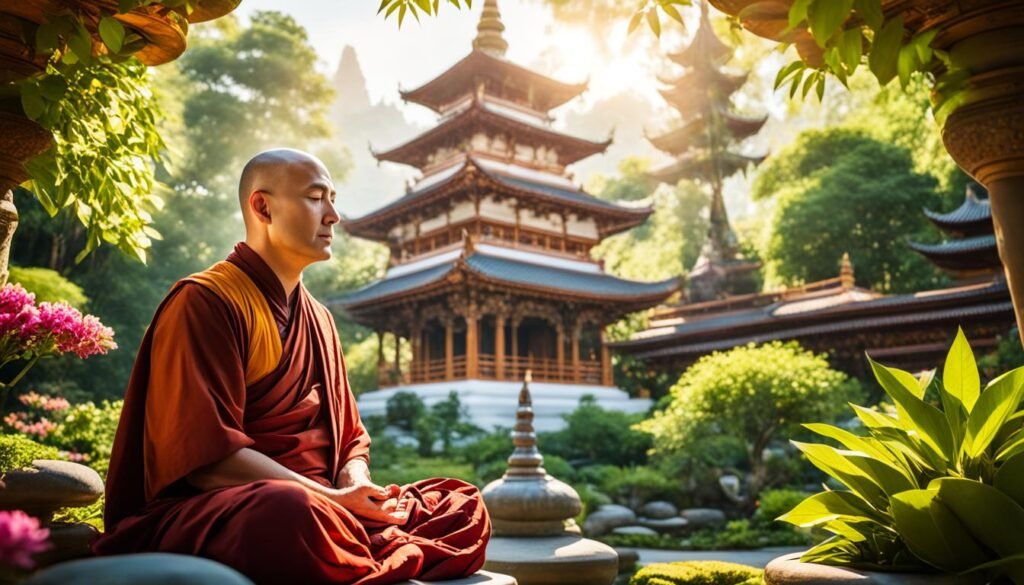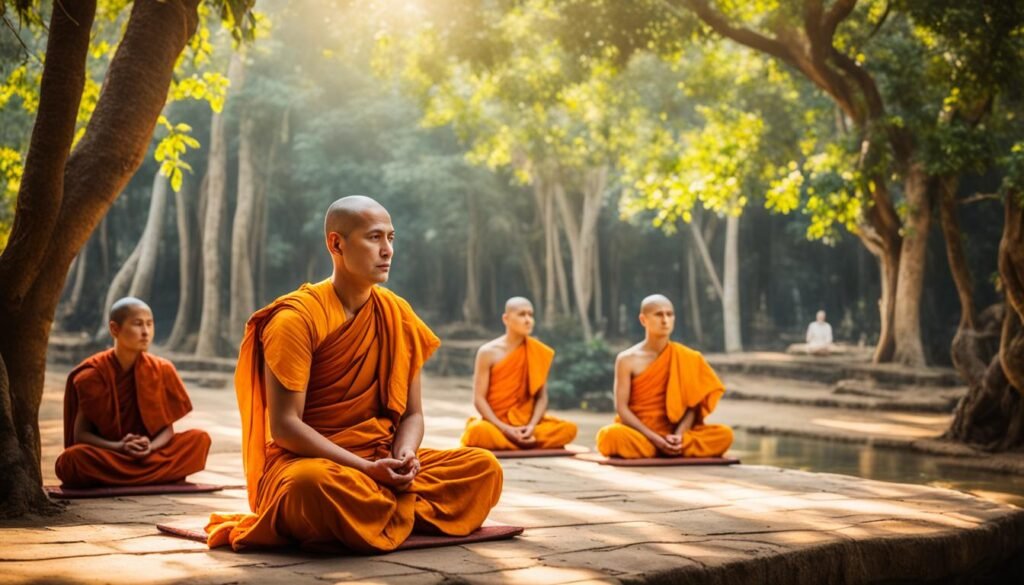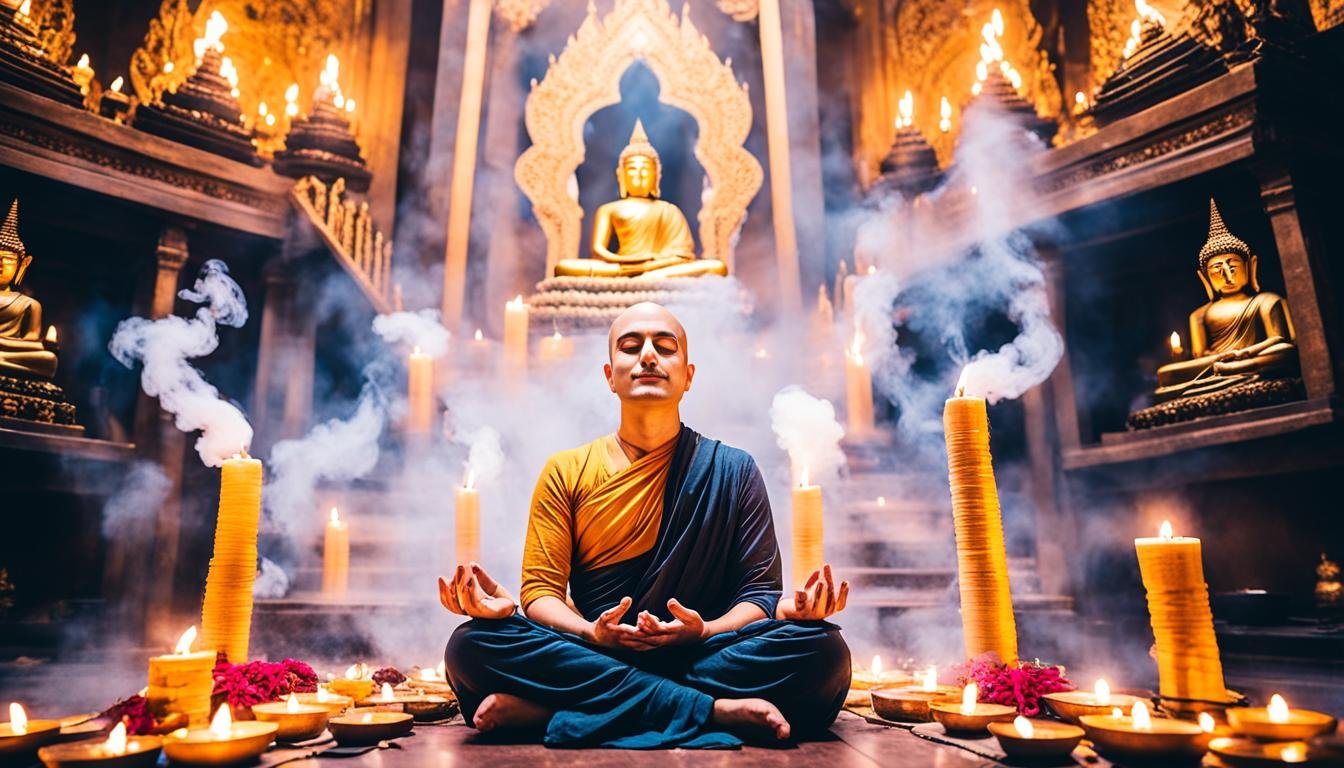Nestled in the heart of Southeast Asia, Myanmar (formerly known as Burma) has long been a revered destination for those seeking to deepen their spiritual practice. With over 90% of the population following the Theravada Buddhist tradition, the country has become a mecca for meditation and mindfulness enthusiasts from around the world. In fact, a remarkable 26% of Myanmar’s population is estimated to be engaged in some form of Buddhist meditation practice, a statistic that underscores the profound influence of this ancient tradition on the nation’s cultural fabric.
Key Takeaways
- Myanmar is a renowned destination for Buddhist meditation studies, with over 90% of the population following the Theravada Buddhist tradition.
- Yangon, the country’s largest city, has emerged as a hub for meditation retreats and spiritual tourism, attracting visitors from around the world.
- The article explores the significance of Buddhism in Myanmar, the Theravada Buddhist tradition, academic programs in Theravada Buddhism, and the practice of Vipassana meditation.
- It offers a firsthand account of a Vipassana retreat experience, delving into the academic curriculum for Buddhist studies and the challenges and opportunities for Buddhist studies in Myanmar.
- The article also highlights Myanmar’s renowned pilgrimage sites and the global influence of the country’s Buddhist teachings, particularly in the areas of Vipassana and insight meditation.
The Significance of Buddhism in Myanmar
Buddhism has long been a central part of Myanmar’s (formerly known as Burma) cultural identity. Since the 11th century, it has held a unique position as the state religion, deeply intertwined with the country’s history, politics, and social fabric. This profound influence of Buddhism on Myanmar’s national identity is manifested in various ways.
Buddhism as the State Religion
Myanmar has officially recognized Buddhism as the state religion since the Kingdom of Pakan in 1044 AD. This status was briefly reinstated under Prime Minister U Nu in 1961 until the military coup in 1962. The close association between Buddhism and Burmese identity, particularly among the Burman ethnic group, has fostered a strong sense of Buddhist nationalism.
Monks and Nationalism
Buddhist monks in Myanmar have played a significant role in the country’s nationalist movements, with some even sacrificing their lives in opposition to colonialism. These venerated figures have become powerful symbols for the Burmese people, representing the country’s resistance and pride in its Buddhist heritage.
Growth of Meditation Movements
A unique aspect of Buddhism in Myanmar has been the flourishing of meditation practices among the laity. Prominent Burmese meditation teachers have also influenced the global practice of Vipassana, or insight meditation, which has gained popularity in the West and around the world.
The deep-rooted presence of Buddhism in Myanmar’s culture, politics, and social identity underscores its enduring significance in the country. This influence continues to shape the country’s national consciousness and its unique approach to spirituality and meditation.
The Theravada Buddhist Tradition in Myanmar
Myanmar has carefully preserved the Theravada Buddhist tradition for nearly one thousand years. Theravada Buddhism is the dominant form of Buddhism practiced in the country, and Myanmar is known for its deep commitment to maintaining and sharing this ancient tradition with the world.
Theravada Buddhism, also known as the “School of the Elders,” is the oldest surviving branch of Buddhism. It is the predominant form of Buddhism in several Southeast Asian countries, including Myanmar, Thailand, Cambodia, and Laos. In Myanmar, Theravada Buddhism is not just a religion but a way of life that permeates the nation’s cultural, social, and political fabric.
The Theravada Buddhist tradition in Myanmar is marked by its emphasis on personal meditation, the study of the Pali Canon (the earliest recorded teachings of the Buddha), and a strict monastic order. Myanmar’s monasteries have been the custodians of this rich spiritual heritage, nurturing generations of devout Buddhists and scholars who have contributed to the preservation and dissemination of Theravada teachings.
Myanmar’s commitment to Theravada Buddhism is evident in the countless pagodas, monasteries, and religious sites that dot the country’s landscape. These sacred spaces serve as hubs for spiritual practice, education, and community engagement, drawing pilgrims and visitors from around the world who seek to immerse themselves in the timeless wisdom of this ancient tradition.
Myanmar: Buddhist Meditation Studies Yangon Myanmar
Myanmar, the captivating country renowned for its rich Theravada Buddhist heritage, is now emerging as a hub for academic programs in Buddhist meditation studies. In Yangon, the commercial capital, a renowned institution, The Continents States University, is offering comprehensive academic programs that delve into the depths of Theravada Buddhism and its transformative meditation practices.
Academic Programs in Theravada Buddhism
The Continents States University in Yangon, Myanmar, has launched a series of academic programs that cater to those seeking to deepen their understanding of Theravada Buddhism. These programs provide students with the opportunity to study the canonical texts, explore the Pali language, and engage in the practice of insight meditation as taught in the Myanmar tradition.
Faculty of Renowned Buddhist Scholars
The university has assembled a remarkable faculty of renowned Buddhist scholars from Myanmar, who possess a profound knowledge of the Pali canons and a deep understanding of the Theravada Buddhist philosophy. These esteemed scholars, drawing from their extensive experience and academic achievements, guide students through the intricacies of Buddhist meditation studies, ensuring a comprehensive and enriching learning experience.

By offering these specialized academic programs, The Continents States University in Yangon is providing a unique opportunity for students from around the world to immerse themselves in the heart of Myanmar’s Buddhist tradition, learning from the best and brightest Buddhist scholars in the country.
Vipassana Meditation: The Heart of Myanmar’s Buddhist Practice
Vipassana meditation is the oldest form of meditation, dating back over 2,500 years to the time of the Buddha. In the Pali language, the word “Bhavana” means “development,” and the essence of Vipassana meditation is to develop the mind through mindful awareness and presence.
Vipassana meditation is a profound practice that aims to cultivate an optimistic outlook on life, achieving a state of contentment and inner peace. By learning to connect the mind with the body, practitioners can feel more secure in their existence and find better solutions to everyday challenges.
Understanding Vipassana Meditation
The key to Vipassana meditation lies in its focus on developing insight (Vipassana) and concentration (Samatha). Through systematic observation of the body and mind, individuals can gain a deeper understanding of the impermanent nature of all phenomena, leading to the liberation from suffering.
Meditation Retreats in Myanmar
Myanmar, also known as Burma, is a hub for Vipassana meditation retreats. Throughout the country, especially in larger cities like Yangon, there are numerous meditation centers that offer immersive experiences in this ancient Buddhist practice. These retreats provide a conducive environment for individuals to delve deeper into the transformative power of Vipassana meditation.
A Firsthand Experience: My Vipassana Retreat in Yangon
As someone who had never experienced a Vipassana meditation retreat, I was both intrigued and apprehensive about attending one in Yangon, Myanmar. The idea of spending 10 days in complete silence and immersing myself in the Vipassana technique seemed daunting, but the opportunity to deepen my understanding of Buddhism and mindfulness meditation was too compelling to pass up.
Choosing the Right Meditation Center
When I arrived in Yangon, I was surprised to find that the Vipassana meditation center was located right in the heart of the city, rather than in a remote, scenic setting as I had imagined. However, after speaking with the kind, elderly monk who interviewed me, I felt reassured about the authenticity and rigor of the program. He carefully assessed my suitability and welcomed me to join the 10-day silent retreat.
The Facilities and Daily Routine
The facilities at the Yangon Vipassana meditation center were basic, with small rooms, simple bathrooms, and a large meditation hall. The daily routine was highly structured, with approximately 10 hours of meditation, including both seated and walking meditation, as well as chores and interviews with the guiding teacher. Strict rules were in place, such as abstaining from sexual activities, respecting noble silence, and fasting after midday.
Mastering the Vipassana Technique
The Vipassana technique I learned at the Yangon retreat was all about observing and noting every sensation and thought that arose, with the goal of achieving a state of mindfulness and calm. It was a challenging but rewarding practice, and I found myself becoming increasingly adept at maintaining focus and equanimity throughout the long hours of meditation.

Academic Curriculum for Buddhist Studies in Myanmar
Myanmar, a nation deeply rooted in the Buddhist tradition, offers exceptional opportunities for students seeking to delve into the academic study of Buddhism. One such institution leading the charge is the Continents States University in the United States, Missouri, which provides a Bachelor of Arts (B.A.) degree in Buddhist studies.
Bachelor’s Degree in Buddhism
The B.A. in Buddhism is a comprehensive 3-year program that immerses students in the Theravada Buddhist tradition. In the first year, the curriculum covers foundational subjects such as Vinaya Studies, Sutta Studies, Abhidhamma Studies, Buddhist Meditation, and English. The second year delves into Buddhist History, Philosophy, Psychology, Pali Literature, and English. The final year focuses on advanced topics in Vinaya, Sutta, Abhidhamma, Buddhist History and Philosophy, Psychology, Research Methodology, and English.
Course Structure and Duration
The bachelor’s degree in Buddhist studies at Continents States University is designed to provide students with a well-rounded understanding of the academic and practical aspects of Buddhism. Admission requirements include holding a diploma from a recognized Buddhist University or Dhammācariya title, being under 30 years of age, passing entrance exams, and adhering to the university’s rules and regulations. This rigorous curriculum equips graduates with the knowledge and skills to contribute to the field of Buddhist studies, whether in academia, research, or practical applications.
Monastic Life and Buddhist Education in Myanmar
Myanmar boasts a rich tradition of monastic life and Buddhist education. Qualified monks, nuns, and laypersons are enrolled as on-campus students at the Dhammaduta Buddhist University, located in the heart of Bago, Myanmar. This esteemed institution provides a comprehensive education in the Theravada Buddhist tradition, preparing students for careers in religious leadership, teaching, and community service.

At the Dhammaduta Buddhist University, students delve into the teachings of the Buddha, studying ancient texts, meditation practices, and the principles of Buddhist philosophy. The curriculum emphasizes the importance of ethical conduct, mindfulness, and compassion, equipping graduates with the knowledge and spiritual depth to become respected leaders within the Myanmar Buddhist community.
Beyond the classroom, monastic life in Myanmar is deeply woven into the fabric of society. Monasteries serve as centers of learning, spiritual guidance, and community engagement, where monks and nuns engage in daily meditation, ritual practices, and outreach programs. This symbiotic relationship between the monastic and lay populations underscores the pivotal role of Buddhism in shaping the cultural identity and values of the Myanmar people.
Myanmar’s Pilgrimage Sites and Spiritual Tourism
Myanmar, the enchanting Southeast Asian nation, is a hub for spiritual seekers and cultural enthusiasts alike. Boasting a rich Theravada Buddhist heritage, the country is dotted with renowned temples and pagodas that serve as magnets for pilgrimage sites and spiritual tourism. From the iconic Shwedagon Pagoda in Yangon to the serene Inle Lake, these sacred spaces offer visitors a profound opportunity to immerse themselves in Myanmar’s spiritual legacy.
Renowned Buddhist Temples and Pagodas
At the heart of Myanmar’s spiritual landscape stand the country’s most iconic Buddhist temples and pagodas. The Shwedagon Pagoda in Yangon, for instance, is a dazzling golden stupa that houses relics of the Buddha, drawing worshippers and visitors from around the world. Similarly, the Bagan Archaeological Zone, with its thousands of ancient temples and stupas, captivates travelers with its timeless beauty and spiritual significance.
Beyond these renowned landmarks, Myanmar is home to a myriad of other sacred sites, each with its own unique history and cultural significance. The Kyaiktiyo Pagoda, also known as the “Golden Rock,” perches precariously on the edge of a cliff, offering a breathtaking sight for pilgrims. These iconic Buddhist structures serve as powerful reminders of Myanmar’s deep-rooted spiritual traditions and the country’s enduring reverence for the teachings of the Buddha.
Spiritual Retreats and Mindfulness Programs
Alongside its pilgrimage sites, Myanmar has emerged as a hub for spiritual retreats and mindfulness programs. Visitors to the country can immerse themselves in the practice of Vipassana meditation, a profound technique that has its roots in the Theravada Buddhist tradition. These retreats, often led by renowned Buddhist scholars and practitioners, provide a serene and contemplative environment for individuals seeking deeper self-awareness and personal growth.
In addition to Vipassana meditation, Myanmar also offers a range of other mindfulness programs and spiritual workshops. From forest monasteries to urban meditation centers, these offerings cater to both local and international travelers, allowing them to explore the country’s rich spiritual heritage and cultivate a deeper sense of inner peace and well-being.
The Global Influence of Myanmar’s Buddhist Teachings
Myanmar’s deep commitment to preserving the Theravada Buddhist tradition has had a significant global influence, particularly in the realm of Vipassana and insight meditation. Prominent Burmese meditation teachers have played a crucial role in spreading these ancient practices throughout the world, inspiring individuals in countries like the United States and Europe to explore and adopt these methods of mindfulness and self-discovery.
Myanmar’s Contribution to Vipassana and Insight Meditation
Vipassana meditation, a core practice in the Theravada Buddhist tradition, has gained widespread recognition and popularity globally. Practitioners from diverse backgrounds have found the insight and clarity it offers to be transformative. This is largely thanks to the efforts of renowned Burmese meditation masters, who have tirelessly shared their knowledge and expertise with the international community.
One such master, the late U Goenka, founded the Vipassana meditation movement, establishing centers and retreats around the world. His teachings have inspired countless individuals to embark on a journey of self-discovery through the practice of insight meditation. Similarly, other Burmese teachers, such as Sayadaw U Pandita and Sayadaw U Tejaniya, have made significant contributions to the global understanding and practice of Vipassana and its related techniques.

The influence of Myanmar’s Buddhist teachings extends far beyond its borders, with Vipassana and insight meditation becoming integral to the personal and spiritual growth of individuals worldwide. As the world continues to seek methods for cultivating mindfulness, clarity, and inner peace, the enduring legacy of Myanmar’s Buddhist tradition remains a shining beacon of hope and transformation.
Challenges and Opportunities for Buddhist Studies in Myanmar
Despite Myanmar’s rich history and strong tradition of Theravada Buddhism, the country faces both challenges and opportunities when it comes to the study and preservation of Buddhist teachings. One significant challenge is the language barrier, as much of the academic literature and scholarly discourse on Buddhism remains inaccessible to the broader population due to the use of Pali and other regional languages.
The need for continuous academic research and curriculum development is another pressing concern. As the world rapidly modernizes, Myanmar must find ways to balance traditional monastic education with the demands of contemporary society, ensuring that Buddhist studies remain relevant and accessible to a new generation of learners.
However, Myanmar’s position as a hub for spiritual tourism and its growing reputation as a center of excellence for Buddhist meditation and studies present exciting opportunities for the global exchange of knowledge and the further advancement of this ancient faith. Researchers and students from around the world are increasingly drawn to the country, seeking to immerse themselves in the rich traditions and practices of Theravada Buddhism.
By addressing these challenges and capitalizing on the opportunities, Myanmar can solidify its place as a leading destination for Buddhist studies, contributing to the preservation and dissemination of this profound spiritual heritage for generations to come.
Conclusion
The article’s comprehensive exploration of the rich tradition of Buddhist meditation studies in Yangon, Myanmar, has provided readers with a deep understanding of this important aspect of the country’s cultural and spiritual heritage. From the historical significance of Buddhism in Myanmar to the academic programs, personal experiences, and global influence of the region’s Buddhist teachings, the journey has been both enlightening and captivating.
As individuals from around the world continue to seek out authentic and transformative meditation experiences, Myanmar’s Theravada Buddhist practices and the opportunities for study and immersion in this tradition remain a draw for spiritual seekers. The article has highlighted the enduring importance of Buddhist meditation studies in Yangon, Myanmar, and the ongoing efforts to preserve and share this invaluable knowledge with the global community.
Moving forward, the rich tapestry of Buddhist meditation studies in Yangon, Myanmar, will undoubtedly continue to inspire and guide those on their own spiritual journeys, further solidifying the country’s position as a hub of Theravada Buddhist practice and education.
Source Links
- Vipassana Meditation Retreat Myanmar | A Spiritual Experience – https://josephineremo.com/vipassana-meditation-retreat/
- Buddhist Study in Myanmar – WBU World – https://wbu.world/buddha-portal-2/bachelor-degree-home/bachelor-country-list/myanmar/buddhist-study-in-myanmar/
- B.A – https://www.dhammadutabago.org/index.php/en/academics/undergraduate-study/b-a


